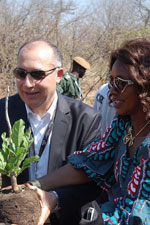
Dr Scott was joined by his wife Dr Charlotte Scott, the Zambian Minister of Tourism Sylvia T. Masebo, Minister of Chiefs and Cultural Affairs Nkandu, Senior Chief Ndungu of the Luvale people, Tourism Permanent Secretary Daisy Ngambi and her Southern Province counterpart, Bernard Namachila.
The event included speeches from VP Scott; Kelvin Musana, acting MD, Standard Chartered Bank Zambia Plc. (one of the sponsors for this event along with Zambezi Nkuku); Lauren O'Donnell, director of Greenpop and Benjamin Mibenge, director of Greenpop Zambia.
This was followed by the planting of 200 indigenous trees, the unveiling of a commemoratve plaque, Zambian cultural dancing, a traditional lunch catered by the Zambian Widows Network Association, solar cooker demonstrations and the making of a rocket stove which drastically reduces the need for charcoal (by Grassroots Trust). The event also featured an environmental performance from the students of Palmgrove Basic School, an art exhibit by Kachera Art Zambia and a newly launched environmental song called Mama Africa produced by Grassroots Trust and performed by some of Zambia's most prominent musicians including Maureen Lilanda, who has long been Zambia's top Diva and is known internationally.
The site for the tree planting ceremony was at the beautiful upstream viewing area of the Victoria Falls on the Livingstone side overlooking the Zambezi river and the Smoke that Thunders.
In his speech, Dr Scott expressed regret that some people in Zambia have embarked on practices that increase deforestation and are illegally exporting charcoal to neighbouring countries. He said the reforestation exercise conducted by Greenpop and its partners is in line with the Zambian government's resolve to plant over 20 million trees countrywide to replace those that were being cut-down indiscriminately by not only charcoal burners, but including traditional practices such as chitimene farming practices and other deforestation drivers. Chitimene is when trees are cut, piled and burnt. Thereafter the ash is used to produce improved crop yields. Unfortunately, the practice is wasteful as the area used for farming is only about 20% of the total area cleared.
Zambia has seen rampant deforestation in recent decades, mainly as a result of bad land management, slash and burn farming methods, unsustainable logging and tree cutting for charcoal. According to the UN-REDD programme, Zambia has approximately 50 million hectares of forest, with an estimated deforestation rate of 250,000 to 300,000 hectares per year. The deforestation results in a change in the local ecosystem, a loss of biodiversity and increased incidence of both drought and flooding. It also means a decline in food security due to a reduction of agricultural yields and the loss of valuable forest resources. Additionally, women have to walk further to find wood, resulting in less productivity and children being left alone at home.
Lauren O'Donnell, Greenpop director, said, "It is wonderful to see so many high-level people and government departments supporting tree planting and sustainability initiatives. It is important for us to remember that there are many different solutions and that we can all act together to curb deforestation in Zambia by taking on a holistic approach to conservation." She stressed that eco-tourism is particularly important in ensuring that tourists enjoy travelling in a way that does not negatively impact the environment.
Dr Scott also unveiled a plaque to commemorate the planting of the trees during the UNWTO, which is permanently stationed within the Victoria Falls World Heritage Site. Some of the indigenous trees which were planted included Knob Thorn, Tamarindus indica, Trichilia emetica, Combretum imberbe, Kirkia acuminata among other species appropriate to the area identified by the National Heritage Conservation Commssion who look after this site and were one of the host organisations for the event.
Greenpop is a non-governmental organisation that has been advocating tree planting and sustainable living in Livingstone for two years. This is an environmental sustainability project that has been working with the Department of Forestry, National Heritage Conservation Commission and other stakeholders in Livingstone. The Ministry of Tourism has taken keen interest in this tree planting initiative considering that tourism is highly dependent on the environment and natural resources.
The event was hosted by Greenpop, National Heritage Conservation Commission and the Ministry of Tourism. It was sponosred and made possible by Standard Chartered Bank and Zambezi Nkuku who came on board and sponsored the trees and the lunch - making the Victoria Falls World Heritage Site 200 trees richer.